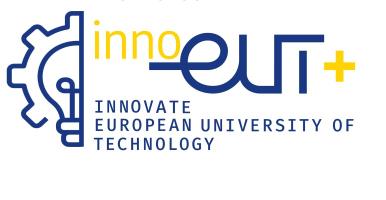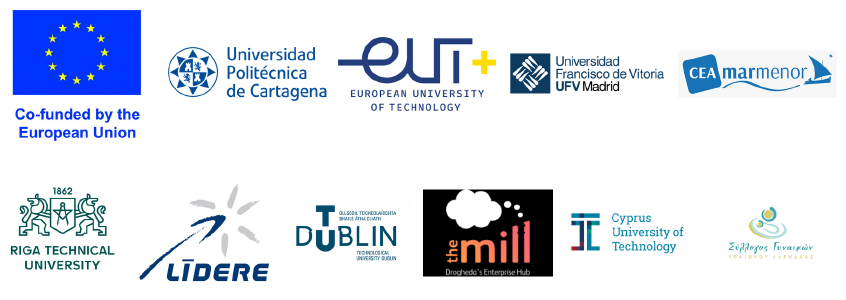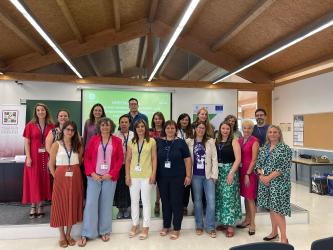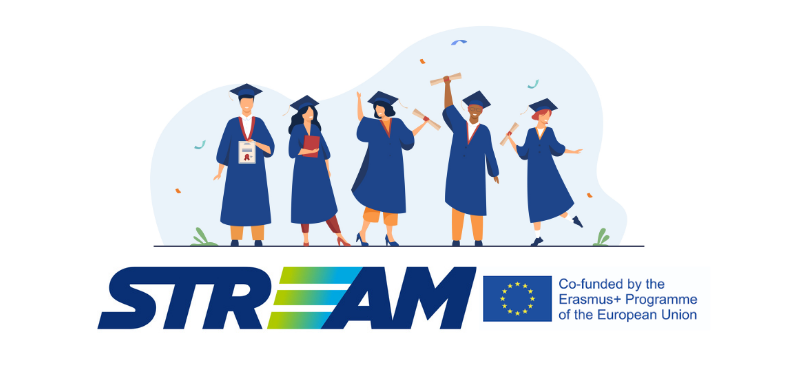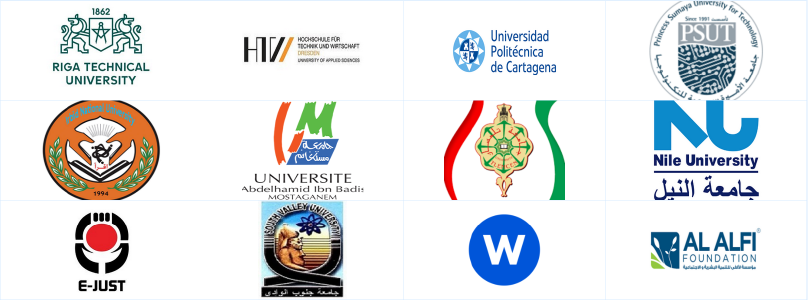In the same section
- Inno-EUt+
-
The Innovative European University of Technology (Inno-EUt+) is an EIT HEI Initiative project aiming to enhance the innovation and entrepreneurial capacity of a new European University Alliance, the European University of Technology (EUt+).
The alliance's partners are already committed to a progressive merger of educational and research operations, co-creating possibilities for their staff and student bodies across all of the alliance's sites. EUt+ is about the future and “puts human first”, recognizing the roots of their constituents and joint forces while considering inclusion, diversity (multilingualism and multiculturalism) and fully oriented to society and to the introduction of innovative technologies in education and entrepreneurship. T
ogether with its non-HEI partners, Inno-EUt+ spans across all corners and the heartland of Europe and creates a strong knowledge triangle in order to develop staff and students and transform both its HEIs and the Alliance:- Cyprus University of Technology (Lead partner) (Cyprus)
- Polytechnic University of Cartagena (Spain)
- Technical University of Sofia (Bulgaria)
- University of Technology of Troyes (France)
- Riga Technical University (Latvia)
- Technical University of Cluj-Napoca (Romania)
- Technological University Dublin (Ireland)
- Chrysalis LEAP (Cyprus)
- Stichting Water Alliance (Netherlands)
The Innovation Vision Action Plan (IVAP) will enable the ambitious institutional transformation the project envisions by creating and coordinating knowledge-creating teams to boost and align the respective research and innovation strategies of the seven partner HEIs and leverage the two non-HEI partners and regional complementarities and transfer opportunities.
The project’s roadmap aims to:
- achieve institutional and infrastructural integration to align its respective research and innovation strategies and deliver a common research and development roadmap;
- develop human capital for Europe to achieve collective excellence, agile career paths and truly participatory processes;
- foster exchanges with broader society to be locally anchored and reach global impact;
- experiment with methods and dissemination to provide a generalizable model of institutional transformation.
The project’s IVAP focuses on areas that have been highlighted for improvement. Specifically, the three areas where most HEIs have more room for improvement, including ‘Entrepreneurial Teaching and Learning’, ‘Organizational Capacity’ and ‘Measuring Impact’.
The IVAP’s objectives:
- develop inclusive joint formal and informal entrepreneurial curricula to encourage students (undergrad/postgrad) and researchers to think like entrepreneurs and seek to find value propositions to local and societal challenges in a sustainable way;
- train academic and non-academic staff to inspire, coach and nurture individuals or teams of aspiring entrepreneurs in a diverse student and researcher body;
- develop a strategy document related to the research and innovation roadmap to encompass entrepreneurship in terms of culture, funding schemes and other support actions;
- develop a robust methodology for regularly assessing entrepreneurship-related activity across all campuses.
If you would like to keep up on the latest content and project results, come by and join our (social media) community:
- Instagram
- Facebook
- LinkedIn
- ETHICO
- There is an urgent need for 21st century education to be able to address the complex problems of the climate crisis and questions of technological development (Anthropocene). A radical new approach is required, and we believe that teaching Ethics and Ecology in Technological Education will provide students with the right set of skills and competences to tackle the problems of climate change through sustainable technological development.
Ethics in this context needs to be understood as a form of praxis, an individual practice which has collective implications, the ethical relation to the other has now come to the fore through as a worldwide pandemic of COVID19. The reaction to COVID-19 has demonstrated when there is an urgency, a public health emergency, the individual can see beyond their own needs and can act locally and globally at the same time. It is the sum of micro-decisions which when brought together have global impact. The question that Greta Thunberg poses is ‘how dare you’ not react requires that the academic community does by ensuring that the question ethics and ecology are embedded within all programmes of Higher Education. In order to do so staff and students need to understand that the the ecological questions and the ethical question are one and the same, that there is a profound overlap between ethos and ecology.
Our objective is to design innovative, ethico-ecological education methods which are transferable to different disciplines in the Technological University, from Arts, Humanities and Social Science to design to Engineering and the Environmental sciences. This is accompanied by the development of an expanded understanding of technology, technology not simply as an application of science but techne as the mode through which we become human. In the long term, our objective is to transform technical or technological education to make it more sustainable for the individual and for society. - LUDEIA
- Ludeiai is based on an observation: curricula in higher education are becoming less and less linear, due to the continuous increase in international mobility, new audiences that need to be integrated and the recognition of non-formal learning. Today, universities’ information systems are struggling to manage this complexity in terms of information exchange.
Ludeia aims to build the foundations of a standard of “universal description” of academic and education information. Rather than a unified global information system, we will be experimenting the construction of a "pre-standard", allowing current local information systems (IS) secure and encrypted data exchanges thanks to standardization of data formats and the implementation of inter-IS connector devices. As a result, the local ISs will communicate via a micro-service library in interconnection. This decentralised system allows the metamodelling of curricula (by data ingestion) and thus offers great technical flexibility allowing strong support for diversity and pedagogical evolutions. In this way, information systems will be able to interoperate in a fluid manner with connector networks that ensure redundancy of information in real time.
The European student card will be usefully used as an identifier, providing students access to their own information (results, courses, etc.) and to academic information from other universities (teaching guide, etc.), from anywhere. When necessary, he will also be able to give controlled access to his information (departure or return from inter-university mobility, the internship company or future recruiter).This open and decentralized system will allow any other institution to participate in these exchanges, simply by implementing the necessary connectors.
This exploratory project is carried out by the eight partners of the "European University of Technology - EUt+" Alliance. They anticipate the development of their common decentralised infrastructure, mainly to support the numerous student mobility within the Alliance.This project will demonstrate how to offer efficient services quickly, based on current information systems, thanks to a common standard, that does not require a common platform or any kind of centralisation. - B+NESDG
-
The B+NESDG project has been created with the aim of applying the Principles of Sustainable Development in Nepal and Bhutan.
The principles of Sustainable Development are fundamental to carrying out any activity that contributes to improving a country’s standards of living.
The B+NESDG project has been created with the aim of applying these fundamental principles in Nepal and Bhutan.
B+NESDG, a project financed by the Erasmus+ program of the European Union, is focused on Bhutan and Nepal as two countries that need international support to help them develop their own structures.
To achieve its objectives, B+NESDG will carry out a group of activities intended to improve quality through a global perspective of capacity development in six Institutions of Higher Education.
The priority of the project is to convert these centers into international references and provide a positive influence among Institutions of Higher Education in both countries.- Website: https://bnesdg.eu/
- Facebook: https://www.facebook.com/bnesdgproject
- Instagram: https://www.instagram.com/bnesdg/
- YouTube: https://www.youtube.com/channel/UCV4mTvC9Nu8eevBATttRIqQ
- SUCCESS
-
The SUCCESS project is carried out in cooperation with for higher education institutions and one company specialized in providing specialized training in the industry. Partners are located in Latvia, Spain, Germany and France:
- RTU (Riga Technical University)
- UPCT (Technical University of Cartagena)
- TU Dresden
- Association Leonardo D Vinci
- Paul Francis East
About the project
The project represents opportunities to develop and implement new innovative ideas in already existing curricula. The main goal is to encourage the use of creative learning and teaching methods by offering students-centered curricula, and to reach a cross-disciplinary approach to engineering studies. Our strategies partnerships, students and specialists involved will help shaping the future of our students.
Why is this project needed?
Considering employers are involved in the fast-increasing industries of IT, mechanics, telecommunications and electronics, there is a great demand for engineering students in today’s society.
The SUCCESS project will generate a dialog on national and transnational level so that employment across different industries and sectors can be improved.
The direct outcomes of the project: our goal is to help students and specialists to develop a skill set that will enhance their confidence and abilities to deliver the knowledge they have in an engaging and interactive way. The indirect outcomes are greater involvement of national and international companies across all industries.
What we are working on?
- Digital communication in the 21st century: to develop learner’s digital skills and etiquette, master their digital communication and presentation skills;
- English for Engineers: English for specific purposes to familiarize participants with the specialist language they need or may need in their daily work lives.
- Career panel: to learn oral presentation, body language, negotiation and argumentation skills required by the industries and labor market for the successful employment;
- Virtual simulation platform for improving communication competences: we will offer a platform for engineering students to put established skills to develop their soft skills by practicing it in the virtual simulation environment.
- Communication deployment kackathon: an international forum with a wide range of skills and specializations, innovation disciplines, to cooperate, learn, participate, and demonstrate their abilities in order to solve various problems while interacting on this international communication platform.
- GREENWORAL
-
The GREENWORAL project
The GREENWORAL project is about empowering adult women in rural areas, equipping them with new digital and green entrepreneurship skills to promote entrepreneurial and innovative activities that are beneficial for the natural environment and with financial profitability for rural women, so as to encourage and facilitate the improvement of the lives and livelihoods of the population in the rural areas, contributing to correct the imbalances between men and women on businesses, as well as achieving a balance between the use of natural resources and the maintenance of income in these areas.
You can discover the website dedicated to the project: herePartners of the GREENWORAL project:
- UPCT (Universidad Politécnica de Cartagena)
- UFV: Universidad Francisco de Vitoria
- CEA Mar Menor
- CUT (Cyprus University of Technology)
- WARL
- RTU (Riga Technical University)
- LIDERE
- DEC
- TUD (Technological University Dublin)
Event:
The Kickoff Meeting: The Kickoff Meeting of the Greenworal Erasmus+ was carried out in Universidad Politécnica de Cartagena, in Murcia, Spain. All of partners attended the meeting to start with the project and design together the next steps. This event took place the 20th and 21st of June 2022.
Social Media of the project:
Instagram: Greenworal
LinkedIn: Greenworal Project https://www.linkedin.com/in/greenworal/
Facebook: https://www.facebook.com/Greenworal-102270625870299/
Twitter: @GreenworalP - STREAM
-
The STREAM project stands for University Student Capacity Building: Towards Readiness for Sustainable Development Oriented Regional Job Market.
The STREAM project is co-funded by the Erasmus+ program of the European Union.
Aim of the project
The aim of the project is to develop a generation of globally-exposed HE graduated, quipped with social and cognitive skills blended with academic competencies, with a higher degree of readiness for the fast-evolving community and job market. A generation who will be capable to integrate the job market in a multicultural and diverse eco-system in an effective manner.
Summary of the project:In the Middle East and North Africa region (MENA) the unemployment rate among HE graduates is among the highest in the world. This is the direct result of the mismatch between education outcomes and expectations of the labor market. With the fast-evolving pattern of the needs of the market as a result of revolutionary technologies such as Industry 4.0, AI, machine learning and, robotics, a new shift un human resources requirements map is at hand leaving HEIs with an unmissable time-pressing challenge to adjust the learning processes to yield specific competencies that expand way beyond the technical knowledge that has been the focus for many decades.
Hence, Competence-tailored Student Journey Map that blends academic and academic complimentary competencies during the student lifetime is introduced.
A pilot set of competence-tailored 35 shorts and 10 long-term extracurricular activities are designed and programmed into the LMS and SIS of HEIs partner along with 35 courses (120 ECTS) in Engineering and ICT restructured to go along with SDGs in competency-based format, targeting the full envisioned picture of the future “Global Citizen” holding skills that were clearly identified through an exhaustive gap analysis developed at the beginning of the project.
A target representing at least 60 students at each of the 7 HEIs partners in Egypt, Jordan and Algeria is planned. Student and stakeholders share an engagement portal, where employers and students share their profiles and both have open arena to engage in internships, summer jobs, capacity building programs is essential in the proposed integrative (academic/extracurricular/industry engagement) approach.
Characteristics, aims and objectives of the project:Specific activity: strengthening the relations between HEIs and the economic and social environment.
Thematic area: university-company cooperation, entrepreneurship and employability of graduatesCBHE Actions:
- Improving the level of skills and competences in HEIs by developing innovative educative programs;
- Improving the quality of higher education and enhancing its relevance for the labor market and the society.CHBE aims and objectives:
- Supporting eligible partner countries to address the challenges facing their higher education institutions and systems, including: quality, relevance, equity of access, planning, delivery, management and governance;
- Supporting the modernization, accessibility and internationalization of the higher education field in the eligible countries partners.The partners of the project:
Website of the project : https://www.svu.edu.eg/ar/stream/



